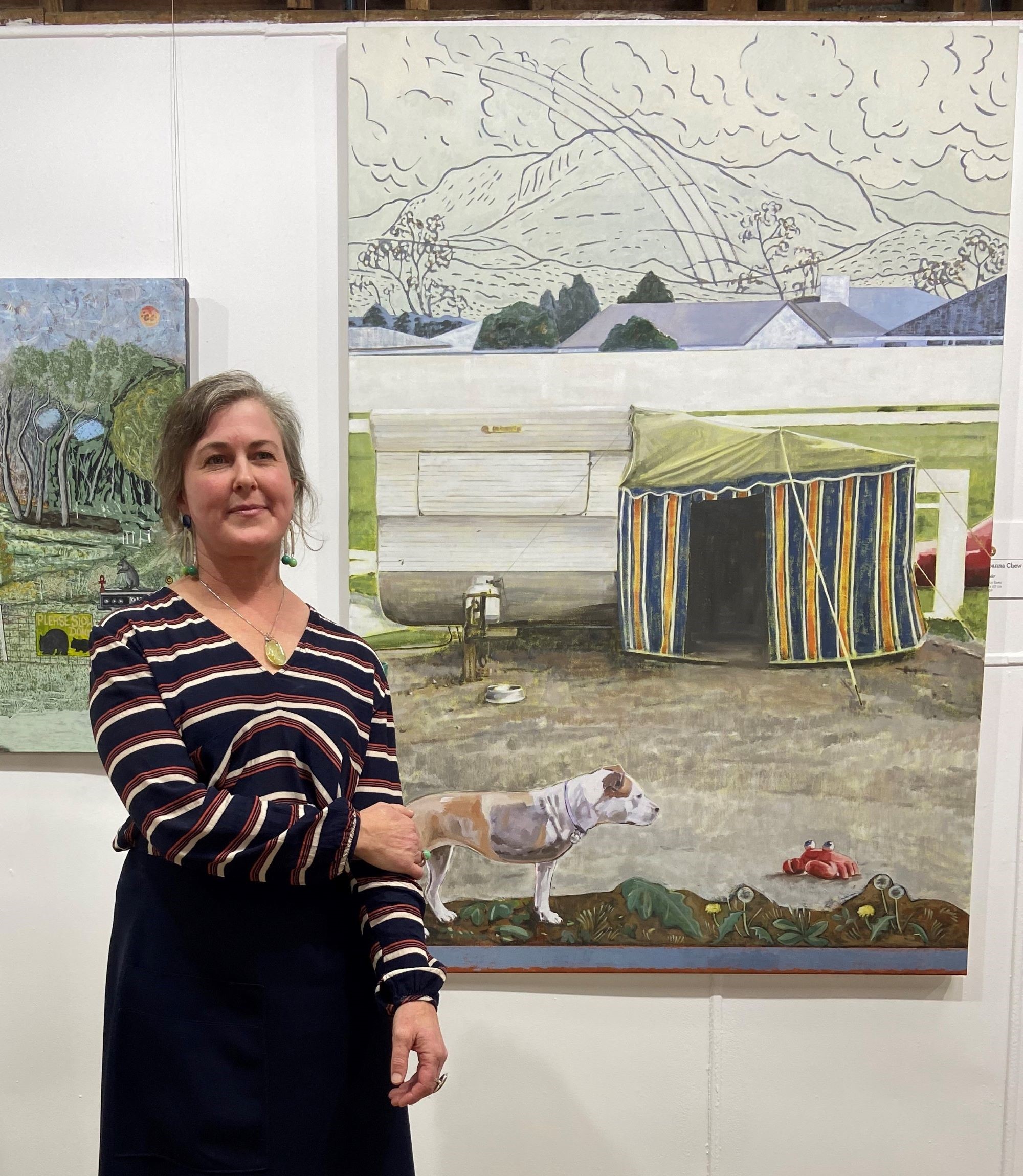When artist Jo Chew (BFA Hons 2018) returned to live in Tasmania with her daughter, she was confronted with a different housing market from the one she left.
“We lived with my parents for a year, unable to find a rental we could afford. It was easy to see why more and more people were forced into solutions like setting up a temporary home at the (Hobart) Showgrounds,” she said.
“I remember seeing prize cows at the Showgrounds as a kid; since returning home, kids have been growing up there in tents and caravans.”
Chew’s PhD studies have revealed homelessness to be a global issue. “There’s a new class of people who are working and sending their kids to school but they can’t afford to pay the rent or find a way forward.”
The experience led to her Glover Prize 2023 winning entry, Tender, a reflection on a broken housing market, and a rental market that prevents many from entering it. The prize is one of Australia’s premier landscape awards, this year attracting over 700 entries from around the world.
Chew, who recently finished her PhD on Displacement, Repair and the Precarity of Home, says artists have a long history of speaking to issues that are important.
“It’s a gentle way to present an idea or provoke a conversation,” she said.
Chew describes painting as nourishing. “It feels like an extension of yourself and your ideas – when it’s flowing, it’s quite a lovely place to be in.”

Photo: The Glover Art Prize
Here she answers some questions for Alumni magazine:
Precarity, particularly as it relates to homelessness, is a theme of your work. Was there something in particular that sparked this interest?
Ideas of home and shelter have been a major part of my practice for a long time. I think I’ve always been aware of how vulnerable humans are and painting temporary forms of shelter stood in for that.
More recently, these ideas were in response to my situation at the time of recommencing study. It was a very difficult time emotionally and financially. People were looking out for us though. I feel like I was very lucky; a lot of people aren’t so lucky.
Has art always been something that you have been drawn to practicing?
Yes, it was always my favourite subject and something I found a lot of joy in. My parents are both creative and fostered my interest in art.
Who are some of your favourite artists who you have drawn inspiration from?
That’s a hard question. I look at and love a lot of artists. I guess, to boil it down, I’m drawn most to art that makes me feel something. I also like it when artists leave gaps in their work, in some way holding back on describing everything – like with good poetry.
Do you have any general advice to the students you teach about being an artist?
If you love it, keep at it. It’s worth doing even if you need to support it with other work. There’s a great story in David Bayles’ book Art and Fear where a ceramics class is divided into two groups. One half were set the task of making one pot as perfectly as they could, the other half just had to make as many as possible. Of course, the most beautiful pieces came out of the half that kept making.
Do you have memories of your time at university that have stayed with you? Perhaps advice from teachers or experiences with other students?
Many! Conversations with my supervisors and other teachers and students over the years have been very rewarding. You learn a lot by working with and alongside other artists.
What advice would you give your younger self?
I guess there’s no going back and changing things. Some of the things I went through could have been avoided. I could have focused earlier on an art ‘career’. But I wouldn’t have had my children if I chose a different path, and I’ve learnt things along the way that have fed my practice.
I think it’s okay to allow life to happen, for the good and the bad to shape you. I’ve had two exhibitions ten years apart with the same title – ‘Everything will be alright’. The first was named after a song by the band Ween (all the titles for that show came from Ween songs); the second was a note to self during a hard time. I guess I’d say hang in there, you’re stronger than you think, and it all works out okay in the end.
Find out more about studying Fine Arts or undertaking a Research degree.
Written by Katherine Johnson for Alumni Magazine Issue 54, 2023.
Connect with our alumni community to discover more.
Top of page: Jo Chew’s Tender, winner of the Glover Prize 2023


